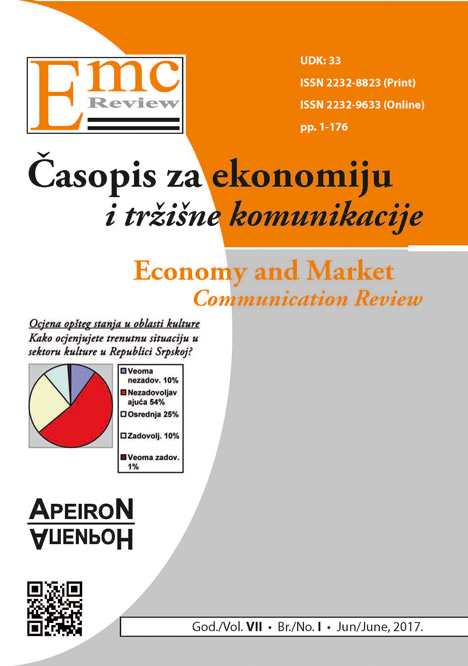CURRENT STATUS, PROSPECTS AND CHALLENGES FOR DEVELOPMENT OF HUMAN RESOURCES IN THE CULTURAL INSTITUTIONS OF REPUBLIC OF SRPSKA / TRENUTNO STANJE, ŠANSE I IZAZOVI ZA RAZVOJ LJUDSKIH RESURSA U OBLASTI KULTURE REPUBLIKE SRPSKE
DOI:
https://doi.org/10.7251/EMC1701008LAbstract
It is a special challenge to explore the status and possibilities of development of human resources in the culture of Republic of Srpska on the institutional level and the level of separate cultural activities and the level of cultural sector as well. The fact is that the socioeconomic circumstances in transitional processes are complex. In those processes, culture is often treated in the public discourse as a significant activator of social development and a representative of our values in the world. Therefore, it is clear that analysing this sector is of a great value.
Interesting are the facts obtained through studying and reviewing the role and influence of human resources both globally and locally. Human resources management in all business systems is becoming completely different from what it used to be before. This is no longer understood as a mere functional activity but also as a new business philosophy to be applied on all managerial levels. In this century, human resources have not only been the key competitive advantage of every organisation, but also every country as well.
The subject of this study refers to the evaluation of the current general situation in the cultural sector in Republic of Srpska, as well as problems, needs and prospects for development of human resources in the cultural institutions in Republic of Srpska. A special value of this scientific study refers to the sample encompassing institutions of different activities – archive, libraries, museums, theatres, cultural centres etc. The sample also includes the institutions outside the aforesaid ones, but which are also seen as institutions significant for the state. The data collected include employees in expert positions in a number of cultural institutions in Banja Luka, Prijedor, Eastern Sarajevo, Gradiška, Doboj, Novi Grad, Trebinje etc.
This paper tries to give a general evaluation of the current status of the cultural sector and assessment of the future prospects. The paper will also try to give an answer to the issues such as where resources can be found for improvement of the general status of culture, what negative influences are and what is the level of cooperation with the industrial sector.
